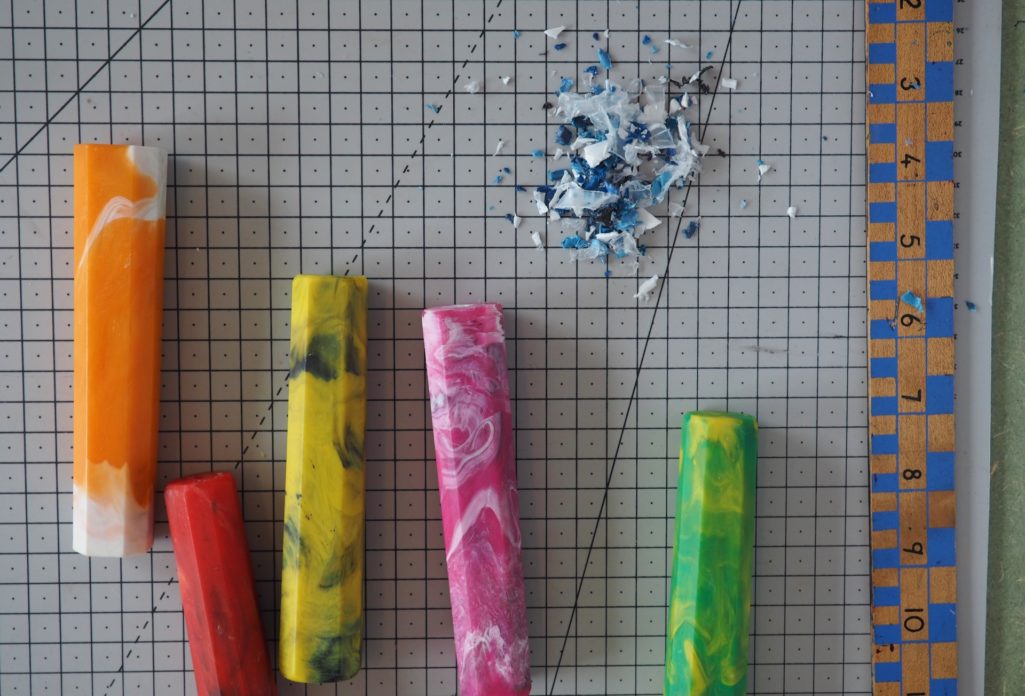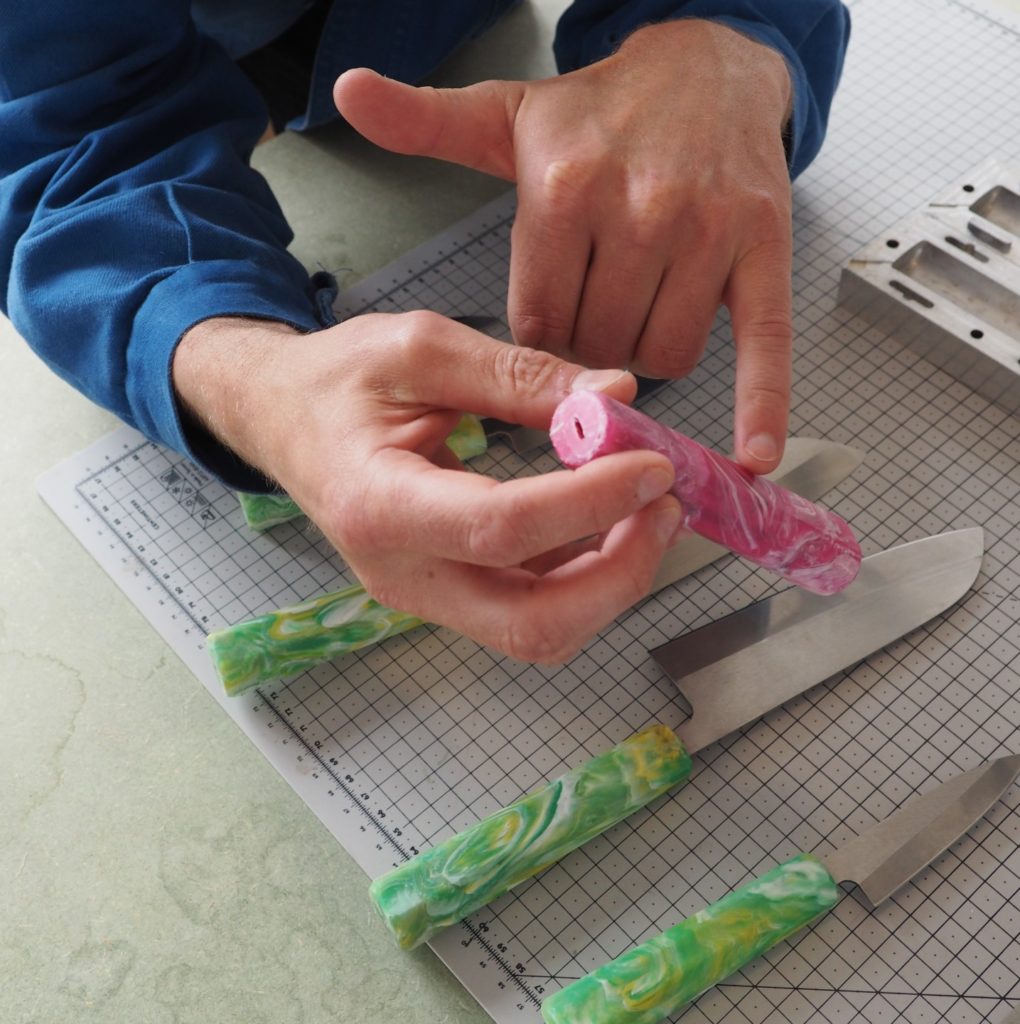BRANDS TO BUYCOTT | #38 ALLDAY GOODS
Words by Christina Dean

Plastic waste is a huge issue across almost all areas of society but the hospitality industry is a particularly bad offender – despite recycling efforts, 74% of plastic waste from the sector is sent to landfill or incinerated. Hugo Worsley, who’s worked in restaurants himself, wanted to try and tackle the amount of plastic waste produced in hospitality whilst also addressing the sustainability, or lack thereof, of cheap knives.
Lower prices makes knives accessible to the home cook in comparison to the expensive top-end knives used by professional chefs, but they don’t last and therefore need replacing much more often, perpetuating the cycle of consumption.
With Allday Goods, Hugo is creating high-quality, long lasting and affordable knives, to fill the gap between “£30 shit supermarket knives and then £300 knives”, that also help divert plastic waste from landfill by recycling it to make the handles. “When I started this project in lockdown there was a rise in people purchasing plant pots for home and gardening. I thought it would be cool to take waste which is going to landfill, because black plastic ends up in landfill, and turn it into the first batch of handles I released,” he says. Initially chopping the plastic by hand, which is laborious as it sounds, Hugo bought a shredder as soon as he had the funds to significantly speed up the process.
“the idea going into it was creating a knife that could last you the rest of your life”
“You have the plastic that you find or you source, typically it’s quite dirty, so you have to first wash the plastic to make sure any bits that could contaminate it are gone because when you go to melt it, it affects the stability of the plastic if there’s dirt in there. So you wash it first, turn it into pellet material, and melt it,” he explains. Once the plastic is melted, it’s injection moulded into the handle shapes and the knife blade is inserted to complete the product.

Hugo launched Allday selling the knives in batches every three months, with each batch using a different type of plastic waste, like milk cartons, plant pots, and fishing nets. He’d go out on trips to get the plastic, like cleaning beaches in Scotland for three weeks, and then bring it all back to make the handles. He also used waste from a commercial knife company in Sheffield, who had a bunch of reject handles made from black plastic that they were going to bin, for a batch of his own handles, enabling him to take waste out of the kitchen and create something of use to go back in it.
The different types of plastic give each batch of knives a backstory but more obviously, they affect the colours of the finished handle. The marbled effect makes each handle unique, even if the colours used are the same, but it took Hugo quite a long time to get right, “six months of me working in lockdown in my parents’ shed playing with plastic,” he says. “You can control it to a certain extent by using more dense pieces of plastic or thicker plastic and flakes or powders, or longer strips, the longer strips melt and form more of the swirly pattern. When you have thick pieces of plastic they tend to stay together and not melt with the other colour – imagine like a Lego brick of plastic, in the time that you’re melting the plastic that bit won’t melt entirely through, it will stay quite true to its colour.”
Of course a knife isn’t a knife without a blade and initially Hugo had been using blades made in Japan. “The idea going into it was creating a knife that could last you the rest of your life and Japan is the best place to go for that, they have the best quality blades,” he says. “But then shipping blades from Japan isn’t sustainable, so I thought if I could get as good blades made locally that would be the golden ticket.” He ran and smashed a Kickstarter campaign selling the Japanese knives to raise the money to move the blade manufacturing to Sheffield.



Known as Steel City, Sheffield has a rich history of knife making though this has been on the decline – in 145 there were 30,000 people working in the cutlery industry in the city and now there’s under 100, and in 1920 there were over 300 knife makers in Sheffield, now there are just five. Allday is now working with one of those last remaining knife makers to make its blades using scrap metal, contributing to this history and supporting local craftsmanship. As Hugo says, “the guy is 73 years old, he’s been working in the same office for 50 years. His great-grandfather set up the business and he took over at 18. In terms of knowledge of knife making, there’s no one better.”
“shipping blades from Japan isn’t sustainable, so I thought if I could get as good blades made locally that would be the golden ticket.”
Now that he’s made the switch with the blades, Hugo is also moving away from the batch model of selling 150 knives every three months to a regular online shop, where three different knives – a small knife (90mm), a big knife (160mm) and a bread knife (200mm) – will be available to buy any time. The Allday website will also be the world’s first customisable knife waste platform, as customers will also be able create a personalised, unique knife by choosing the blade, the handle shape and the waste plastic it’s made from.
And Hugo’s not stopping there. “I’m changing the name from Allday Knives to Allday Goods. I want to do chopping boards, rolling pins, drink coasters, the idea is to have cutlery, steak knives, and lots of other things,” he reveals. It seems one man’s waste really is another man’s treasure.
Allday Goods launches 5th September 2022
alldaymfe.com